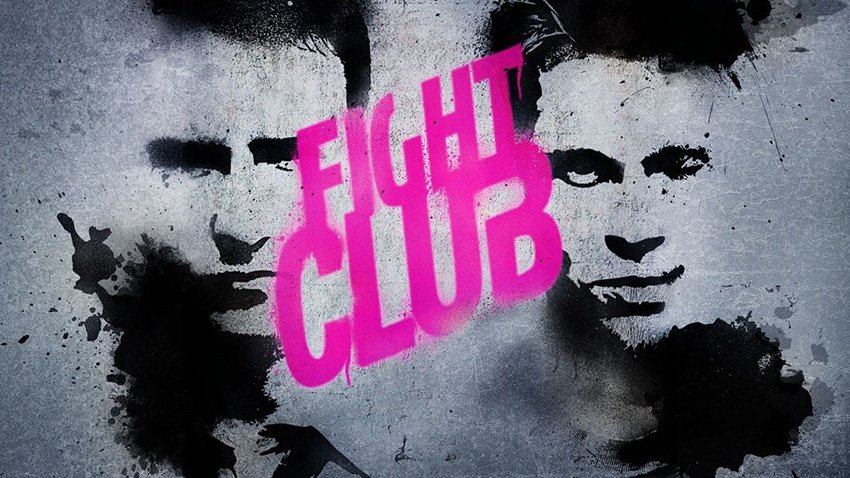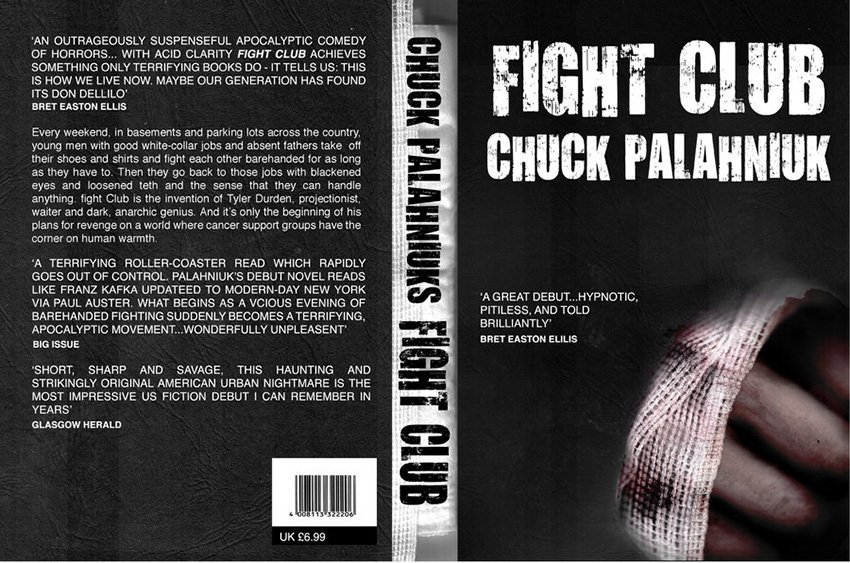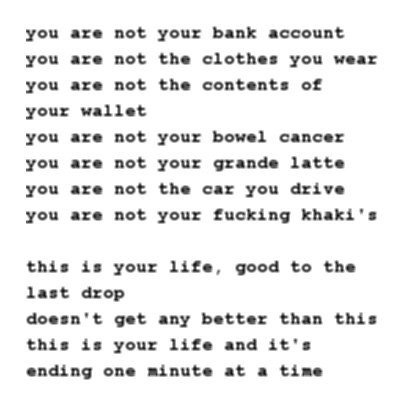
FIGHT CLUB
The first rule of Fight Club is that you do not talk about Fight Club. The importance of this first rule is reinforced by the fact it is also rule number two. But why? What is the significance behind the message that Fight Club was to remain secret and private? Why was there this attempt to remove language and verbalisation from it's existence. Because, I believe, Fight Club represents an internal struggle. A battle that takes place primarily within oneself. To me, Fight Club is a Zen parable. A story about enlightenment. As contradictory as that sounds, which drives that very notion home even stronger. The true fight was never an external experience.
I have heard it said, and read it also many times, that Fight Club is a misogynistic story, in that it deals with a toxic form of masculinity. To watch the film, or even better, read the book, and come away with that understanding is to fail to grasp Fight Club beyond the superficial surface level. Extreme machismo, or toxic masculinity, represents all that is wrong with male culture. The external need for control, domination, subjugation, and ownership. Ownership of the other, whether the other is male or female. It has given us millennia of wars, rape, child abuse, and other destructive practices. This is not male behaviour per se – it is an unbalanced male energy, and male energy has been expressed more prevalently in the past by men.
Yet Fight Club, the book, deals with an inwardly projected force. It has been owned and turned in on itself. It is, at its most basic level, the story of one man who in his search for self understanding disintegrates, and reemerges a new person, having destroyed that part of himself that sought out its own destruction, and the destruction of that which lay outside itself.
It is, ultimately, a thinly veiled story about one man's enlightenment. We never know his name. We only know the name of the man who both pushes him to the brink of knowing truth, and ultimately stands in the way of his ability to 'just let it all go.'
"Enlightenment is a destructive process. It has nothing to do with becoming better or being happier. Enlightenment is the crumbling away of untruth. It's seeing through the facade of pretence. It's the complete eradication of everything we imagined to be true." - Adyashanti.

Fight Club grabs you, challenges you, dares you to dismiss it and cast it aside. It's at times aggressive, demeaning, vulgar and menacing. Yet underneath all of that, a vein of gold slithers through it daring the reader to look deeper.
Touching on consumerism, environmentalism, class struggles, and the apparent meaninglessness of life in today's society, a vision starts to shine from within it's self-centred narrator's internal dilemmas.
Our unnamed narrator struggles with insomnia. A world of self help groups and therapy centres open up to him, and for a while he finds release through them. Through listening to the struggles of other people.
"This was freedom. Losing all hope was freedom."
"Every evening, I died, and every evening, I was born.
Resurrected."
Until Marla shows up, stealing the anonymity and meaning he finds in these groups. And stealing his ability to sleep. And from this we meet Tyler. Although he is initially introduced to us at the start of the book:
"Tyler gets me a job as a waiter, after that Tyler's pointing a gun in my mouth and saying, the first step to eternal life is you have to die. For a long time though, Tyler and I were best friends."
The narrator loves Tyler, Tyler loves Marla, and Marla loves the narrator. This triangle fuels the story, propelling it full speed through the development of Fight Club, with it's various rules, then into Project Mischief and Project Mayhem. And eventually towards full blown destruction. Self destruction. Until the narrator wakes up, and sees reality for what it truly is, and not what he has allowed himself to believe it is. And thus we have the enlightenment angle I mentioned earlier.
"Tyler says to pay attention because this is the greatest moment of my life.
"Because everything up to now is a story," Tyler says, "and everything after now is a story."
This is the greatest moment of our life.
"Tyler Durden the great, who was perfect for one moment, and who said that a moment is the most you could ever expect from perfection."
The movie was brilliant, and the visuals drove home it's message, cementing it's impact upon my psyche. When it came time to read the book I wondered how it would fair compared to the film. They are two different beasts. I think they both have their strengths and weaknesses. Yet it was the book that shook me far more. It was the book that resonated with me on the topic of enlightenment. And it is the book that I recommend above the film (if a choice was required).
Fight Club - Chuck Palahniuk
5 stars.

Thank you for taking the time to read this. If you liked it then please like, comment, and follow
@naquoya
Short Fiction:
Bang Bang You're Dead
I Have No Name and I Must Scream
The Last Book Store
The Judge
The Man In The Mirror
The End of the World [Part 1] [Part 2]
The Locked Room
The Gods of Love and War [Part 1] [Part 2] [Part 3]
Crossroads
